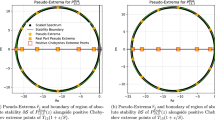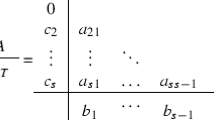Abstract
The paper is devoted to the optimization of the explicit two-derivative sixth-order Runge–Kutta method in order to obtain low dissipation and dispersion errors. The method is dependent on two free parameters, used for the optimization. The optimized method demonstrates the lowest dispersion error in comparison with other widely-used high-order Runge–Kutta methods for hyperbolic problems. The efficiency of the method is demonstrated on the solutions of problems for five linear and nonlinear partial differential equations by the method-of-lines. Spatial derivatives are discretized by finite differences and Petrov–Galerkin approximations. The work-precision and error—CPU time plots, as the dependence of CPU time on space grid resolution, are considered. Also, the optimized method compared with other two-derivative methods. In most examples, the optimized method has better properties, especially for the cases of computations with adaptive stepsize control at high accuracy. The lowest CPU time takes place for the optimized method, especially in the cases of fine space grids.












Similar content being viewed by others
References
Niegemann, J., Diehl, R., Busch, K.: Efficient low-storage Runge–Kutta schemes with optimized stability regions. J. Comput. Phys. 231, 363–372 (2012)
Hairer, E., Wanner, G.: Solving Ordinary Differential Equations II. Stiff and Differential-Algebraic Problems. Springer Series in Computational Mathematics. Springer, Berlin (2007)
van der Houwen, P.J.: The development of Runge–Kutta methods for partial differential equations. Appl. Numer. Math. 20(3), 261–272 (1996)
Abdulle, A., Medovikov, A.A.: Second order Chebyshev methods based on orthogonal polynomials. Numer. Math. 90, 1–18 (2001)
Sommeijer, B.P., Verwer, J.G.: On stabilized integration for time-dependent PDEs. J. Comput. Phys. 224, 3–16 (2007)
Torrilhon, M., Jeltsch, R.: Essentially optimal explicit Runge–Kutta methods with application to hyperbolic–parabolic equations. Numer. Math. 106, 303–334 (2007)
Martin-Vaquero, J., Janssen, B.: Second-order stabilized explicit Runge–Kutta methods for stiff problems. Comput. Phys. Commun. 180, 1802–1810 (2009)
Martin-Vaquero, J., Kleefeld, B.: Extrapolated stabilized explicit Runge–Kutta methods. J. Comput. Phys. 326, 141–155 (2016)
Martin-Vaquero, J., Kleefeld, A.: ESERK5: a fifth-order extrapolated stabilized explicit Runge–Kutta method. J. Comput. Appl. Math. 356, 22–36 (2019)
Komori, Y., Eremin, A., Burrage, K.: S-ROCK methods for stochastic delay differential equations with one fixed delay. J. Comput. Appl. Math. 353, 345–354 (2019)
Mead, J.L., Renaut, R.A.: Optimal Runge–Kutta methods for first order pseudospectral operators. J. Comput. Phys. 152, 404–419 (1999)
Allampalli, V., Hixon, R., Nallasamy, M., Sawyer, S.D.: High-accuracy large-step explicit Runge–Kutta (HALE-RK) schemes for computational aeroacoustics. J. Comput. Phys. 228, 3837–3850 (2009)
Toro, E.F.: Riemann Solvers and Numerical Methods for Fluid Dynamics: A Practical Introduction. Springer, Berlin (1999)
Kulikovsky, A.G., Pogorelov, N.V., Semenov, A.Y.: Mathematical Aspects of Numerical Solution of Hyperbolic Systems. Taylor and Francis Inc, Bosa Roca (2000)
Ilyin, O.: Nonlinear pressure–velocity waveforms in large arteries, shock waves and wave separation. Wave Motion 84, 56–67 (2019)
Tinoco-Guerrero, G., Dominguez-Mota, F., Gaona-Arias, A., Ruiz-Zavala, M., Tinoco-Ruiz, J.: A stability analysis for a generalized finite-difference scheme applied to the pure advection equation. Math. Comput. Simul. 147, 293300 (2018)
Williamson, J.H.: Low-storage Runge–Kutta schemes. J. Comput. Phys. 35, 48–56 (1980)
Hu, F.Q., Hussaini, M.Y., Manthey, J.L.: Low-dissipation and low-dispersion Runge–Kutta schemes for computational acoustics. J. Comput. Phys. 124, 177–191 (1996)
Stanescu, D., Habashi, W.G.: 2N-storage low dissipation and dispersion Runge-Kutta schemes for computational acoustics. J. Comput. Phys. 143, 674–681 (1998)
Bogey, C., Bailly, C.: A family of low dispersive and low dissipative explicit schemes for flow and noise computations. J. Comput. Phys. 194, 194–214 (2004)
Berland, J., Bogey, C., Bailly, C.: Low-dissipation and low-dispersion fourth-order Runge–Kutta algorithm. Comput. Fluids 35, 1459–1463 (2006)
Calvo, M., Franco, J.M., Randez, L.: A new minimum storage Runge–Kutta scheme for computational acoustics. J. Comput. Phys. 201, 1–12 (2004)
Tselios, K., Simos, T.E.: Optimized Runge–Kutta methods with minimal dispersion and dissipation for problems arising from computational acoustics. Phys. Lett. A 363, 38–47 (2007)
Toulorge, T., Desmet, W.: CFL conditions for Runge–Kutta discontinuous Galerkin methods on triangular grids. J. Comput. Phys. 230, 4657–4678 (2011)
Toulorge, T., Desmet, W.: Optimal Runge–Kutta schemes for discontinuous Galerkin space discretizations applied to wave propagation problems. J. Comput. Phys. 231, 2067–2091 (2012)
Ramboer, J., Broeckhoven, T., Smirnov, S., Lacor, C.: Optimization of time integration schemes coupled to spatial discretization for use in CAA applications. J. Comput. Phys. 213, 777–802 (2006)
Hairer, E., Norsett, S.P., Wanner, G.: Solving Ordinary Differential Equations I. Nonstiff problems. Springer Series in Computational Mathematics. Springer, Berlin (1993)
Turaci, M.O., Ozis, T.: Derivation of three-derivative Runge–Kutta methods. Numer. Algorithms 74(1), 247–265 (2017)
Gekeler, E., Widmann, R.: On the order conditions of Runge–Kutta methods with higher derivatives. Numer. Math. 50, 183–203 (1986)
Goeken, D., Johnson, O.: Runge–Kutta with higher order derivative approximations. Appl. Numer. Math. 34, 207–218 (2000)
Wu, X., Xia, J.: Extended Runge–Kutta-like formulae. Appl. Numer. Math. 56, 1584–1605 (2006)
Chan, R.P.K., Tsai, A.Y.J.: On explicit two-derivative Runge–Kutta methods. Numer. Algorithms 53, 171–194 (2010)
Fang, Y., You, X., Ming, Q.: Trigonometrically fitted two-derivative Runge–Kutta methods for solving oscillatory differential equations. Numer. Algorithms 65, 651–667 (2014)
Fang, Y., You, X., Ming, Q.: Exponentially fitted two-derivative Runge–Kutta methods for the Schrodinger equation. Int. J. Mod. Phys. C 24, 1350073 (2013)
Fang, Y., You, X.: New optimized two-derivative Runge–Kutta type methods for solving the radial Schrodinger equation. J. Math. Chem. 52, 240–254 (2014)
Tsai, A.Y.J., Chan, R.P.K., Wang, S.: Two-derivative Runge–Kutta methods for PDEs using a novel discretization approach. Numer. Algorithms 65(3), 697–703 (2014)
Seal, D.C., Guclu, Y., Christlieb, A.J.: High-order multiderivative time integrators for hyperbolic conservation laws. J. Sci. Comput. 60, 101–140 (2014)
Press, W.H., Teukolsky, S.A., Vetterling, W.T., Flannery, B.P.: Numerical Recipes: The Art of Scientific Computing. Cambridge University Press, New York (2007)
van der Houwen, P.J., Sommeijer, B.P.: Explicit Runge–Kutta (Nystrom) methods with reduced phase errors for computing of oscillating solutions. SIAM J. Numer. Anal. 24, 595–617 (1987)
van de Vyver, H.: Stability and phase-lag analysis of explicit Runge–Kutta methods with variable coefficients for oscillatory problems. Comput. Phys. Commun. 173, 115–130 (2005)
Najafi-Yazdi, A., Mongeau, L.: A low-dispersion and low-dissipation implicit Runge–Kutta scheme. J. Comput. Phys. 233, 315–323 (2013)
Wesseling, P.: Principles of Computational Fluid Dynamics. Springer, Berlin (2001)
Franco, J.M.: Runge–Kutta–Nyström methods adapted to the numerical integration of perturbed oscillators. Comput. Phys. Commun. 147, 770–787 (2002)
Dodd, R.K., Eilbeck, J.C., Gibbon, J.D., Morris, H.C.: Solitons and Nonlinear Wave Equations. Academic Press, London (1982)
Li, J.: Multi-step hybrid methods adapted to the numerical integration of oscillatory second-order systems. J. Appl. Math. Comput. 61, 155–184 (2019)
Ablowitz, M.J., Kaup, D.J., Newell, A.C., Segur, H.: Method for solving the sine–Gordon equation. Phys. Rev. Lett. 30(25), 1262–1264 (1973)
Sanz-Serna, J.M., Christie, I.: Petrov–Galerkin methods for nonlinear dispersive waves. J. Comput. Phys. 39, 94–102 (1981)
de Frutos, J., Sanz-Serna, J.M.: An easily implementable fourth-order method for the time integration of wave problems. J. Comput. Phys. 103, 160–168 (1992)
Kalogiratou, Z., Monovasilis, T., Simos, T.E.: Construction of two derivative Runge–Kutta methods of order five. AIP Conf. Proc. 1863, 560092 (2017)
Kalogiratou, Z., Monovasilis, T., Simos, T.E.: Order conditions for two derivative Runge–Kutta methods up to order six. AIP Conf. Proc. 1906, 200020 (2017)
Acknowledgements
The author wishes to thank the anonymous referees for careful checking of the article and helpful comments.
Author information
Authors and Affiliations
Corresponding author
Additional information
Publisher's Note
Springer Nature remains neutral with regard to jurisdictional claims in published maps and institutional affiliations.
Rights and permissions
About this article
Cite this article
Krivovichev, G.V. Optimized low-dispersion and low-dissipation two-derivative Runge–Kutta method for wave equations. J. Appl. Math. Comput. 63, 787–811 (2020). https://doi.org/10.1007/s12190-020-01339-2
Received:
Published:
Issue Date:
DOI: https://doi.org/10.1007/s12190-020-01339-2




